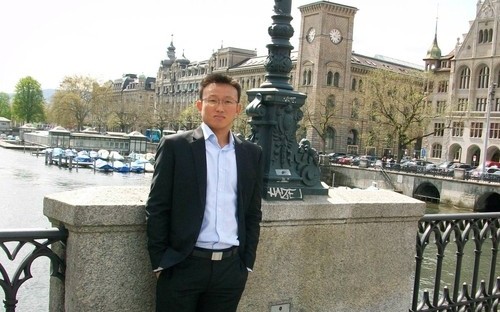Pang was born and raised in Singapore. He went to the US for his first degree, studying materials engineering at the University of Washington in Seattle and graduating in 2000. He followed this up with a PhD at Cambridge University in the UK, which he completed in 2004.
Post PhD, Pang wanted to continue his research in a tech-rich business centre and, he says, Grenoble was an obvious choice.
For those in the know, this beautiful part of south eastern France, towards Switzerland and Italy, is a global centre for tech innovation. Some of the world’s biggest tech companies have research centers there, including HP, STMicroelectronics, Schneider Electric and Caterpillar.
It’s also home to the CEA (Commissariat a l’energie atomique), one of the two biggest French research institutes, set up for nuclear research (it has a particle accelerator similar to the Hadron Collider) but now focused on many different types of technology.
So, after a stint as a senior materials engineer in Singapore, where he was responsible for purchasing a €0.5 million “coating system for hard disk drives”, Pang headed for the CEA, this time as a research engineer working on nanotechnology.
It wasn’t long before the private sector beckoned and Rio Tinto snapped him up to run engineering projects on behalf of international clients. By this time the globetrotting Pang was fluent enough to do his job interview with Rio Tinto in French.
He was with the firm for nearly three years, working with clients across the world. Armed with thorough understanding of microelectronics, materials, mining and the demands of big corporate clients, Pang thought it was time for business school. An MBA would help him make the transition from the technical side to more strategic roles.
“It was a natural progression to do an MBA… I wanted a bigger picture of how companies run and make decisions, and of how they are financed,” says Pang.
He first heard of Grenoble GSB while at Cambridge, but got to know the school a lot better when he moved to the city. He was keen on the length of the program – only ten months – which he is following up with a one-year dissertation in his specialization of technology management. The small MBA class, only 42 students, makes for an intense experience with a lot of interaction with faculty and participation - there’s no place to hide in class.
The transition from engineering to studying business was pretty smooth for Pang. “Engineers tend to be concerned with problem-solving so we look at a situation, analyze it and make a decision according to time constraints,” says Pang.
“When I was a research engineer I often had one or two months to solve a problem and there was no time for trial and error. I had to do a lot of homework – basically research analysis – to decide if it was a go or no go.
“A lot of that translates into business: timing, being precise, being clear on objectives.
“Also,” he adds, “the logic one acquires during an engineering degree is useful in arguing your case and presenting a situation from start to end.”
Pang even thinks engineers have a lot of useful soft skills, at least those who’ve worked on projects: “Teamwork is a soft skill that engineers inherently acquire and can use in a business environment”.
After his MBA, Pang aims to put his business acumen to work to help technology companies as a management consultant or in-house strategist. “I’d like to advise businesses on how to optimize strategy, and on the market position of new technologies and products in the market place.
“I’m also keen to work with start-ups to optimizing their business model, operations and supply chain, and position small companies in a global marketplace.”
Pang expects to stay in Europe, where he says there are great opportunities to work with companies developing new components and hardware-related technology. Many of them are spin-offs from larger European hi-tech firms based in Germany, Switzerland, Scandinavia and France.
The US has the world’s biggest tech-focused venture capital firms, but US companies are stronger in software-related products such as Facebook.
In Europe, says Pang, there are similar funds investing in technology firms. The market may not make as many headlines but it is full of opportunities.
RECAPTHA :
e7
ef
4e
df







